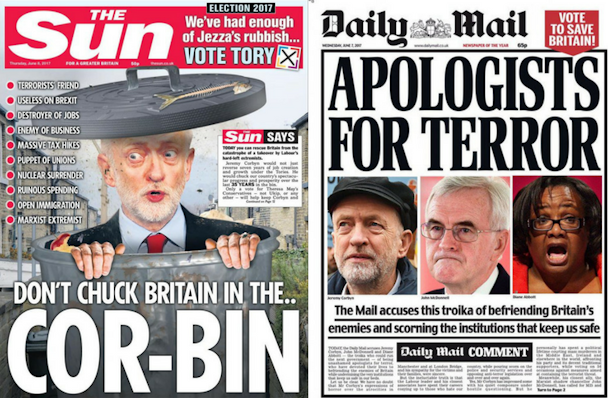Newspapers ‘missed an opportunity’ to rally youth support during the election ‘in the way Labour did’
While the right-leaning newspapers were busy trying to come up with the best Corbyn-bashing puns in the run up to the snap election, the Labour party were quietly mobilising the British youth on social media. Now that the press have called it wrong for a third time in a year (Brexit, Trump) is it time they started to take social’s influence more seriously?

Newspapers were too busy bashing Corbyn to realise he was rallying the youth on social media
British newspapers, especially Conservative-supporting titles, are read by an overwhelmingly older audience. According to the NRS, 70% of readers in print are 35 and older.
What’s more, trust in the written press has faltered in recent years, largely due to its political bias. For its part, the UK press has faced criticism for publishing hyper-partisan headlines that "stretch facts to the absolute limit", breeding increasing levels of mistrust among readers, according to Buzzfeed's political editor Jim Waterson.
Instead, the public are increasingly looking to social media to be informed. A study from Pew Research last year claimed that 62% of the US population get their news from social media, with Facebook cited as the top source for news. Golin’s Global Relevance Review study claimed that over half (59%) of people across 13 countries believe social media to be the most relevant source of information, followed by TV and word-of-mouth, with newspapers and online news ranking last.
With this in mind, the Labour party sought the increasing influence of social media to mobilise the youth vote, particularly in the 18-24 age group, many of whom will never have purchased a print newspaper but consume their news digitally, predominantly through the sharing and reading of articles on social media.
And according to research from Ender Analysis, Labour-supporting titles carry far more influence in terms of shares than Conservative-leaning titles on Facebook, with the Mail receiving less Facebook shares than some individual bloggers during this election campaign.
“On this basis we would suggest that the liberal-leaning Labour-supporting instincts of younger demographics are reflected in their consumption of news on digital platforms,” said Thomas Caldecott, senior research analyst at Ender Analysis.
Caldecott added that tweets and Facebook shares do not account for ‘shy’ Tory voters and do not always translate into electoral success, as evidenced in Ed Miliband’s campaign. But in this election’s case, the main driver of Labour’s surprising gain in seats was due to the party’s “clever” use of social media.
“A lot of media did Corbyn-bashing, because he seemed to be become a caricature of himself and all media jumped in on it. In the meantime he was quietly going around doing probably the better thing than Theresa May was doing connecting with people in a different way. Against all odds he seems to be very successful in that,” said Steve Goodman, managing director of print trading at GroupM.
For Goodman, the newspapers’ failure to rally a Conservative majority does not reflect the dwindling influence of the press, but shines a light on the impact of social media against a younger audience.
“First of all, on the back of what has become known as dementia tax, Theresa May maybe shot herself in the foot and alienated a number of her core supporters because it will indirectly or directly affect so much of that older newspaper audience,” he said.
“On the other hand Corbyn was reengaging with a younger audience on social media in a way that the Conservatives were not, plus offering policies that are very enticing, like scrapping the university fees.”
“What newspapers do need to do more of is doing more to engage themselves brand-by-brand with younger audiences. I don’t think they are fully aware of that, clearly they need to be doing it better,” Goodman added.
If British newspapers are to weather the storm of technological disruption, Goodman advises they take learnings from Corbyn’s campaign, having missed a “big opportunity” to promote themselves to younger audiences “in the way that Labour have done themselves”.
Take a look here at how UK newspapers reacted to the shock result this morning.

